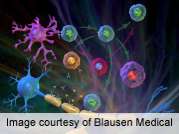Natalizumab shows promise for teens with multiple sclerosis

(HealthDay)—Natalizumab may be safe in pediatric multiple sclerosis (MS) patients with highly active disease, according to a small study published online Feb. 18 in JAMA Neurology.
Barbara Kornek, M.D., from the Medical University of Vienna, and colleagues retrospectively reviewed data on 20 pediatric patients with MS who started treatment with natalizumab (300 mg every four weeks) prior to 18 years of age (mean age at initiation, 16.7 years). These patients underwent MRI as clinically indicated, despite the fact that 19 of the patients were undergoing first-line disease-modifying therapy.
The researchers found that treatment with natalizumab was associated with significant reductions in mean annualized relapse rates (3.7 without treatment versus 0.4 with treatment), median Expanded Disability Status Scale scores (two without treatment versus one with treatment), and mean number of new T2/fluid-attenuated inversion recovery lesions per year (7.8 without treatment versus 0.5 with treatment). Two patients had to stop therapy due to development of high-titer neutralizing antibodies against natalizumab. Other adverse events included headaches, asthenia, infections, and hypersensitivity. Eight patients had abnormal laboratory results, with John Cunningham virus antibodies found in five of 13 patients. Relapse activity occurred in six of eight patients within six months following discontinuation of natalizumab therapy.
"Our data indicate that natalizumab may be safe and effective against MS in pediatric patients with breakthrough disease," the authors write.
Several authors disclosed financial ties to pharmaceutical companies, including Biogen Idec, the manufacturer of natalizumab.
More information:
Abstract
Full Text (subscription or payment may be required)
Health News
Copyright © 2013














